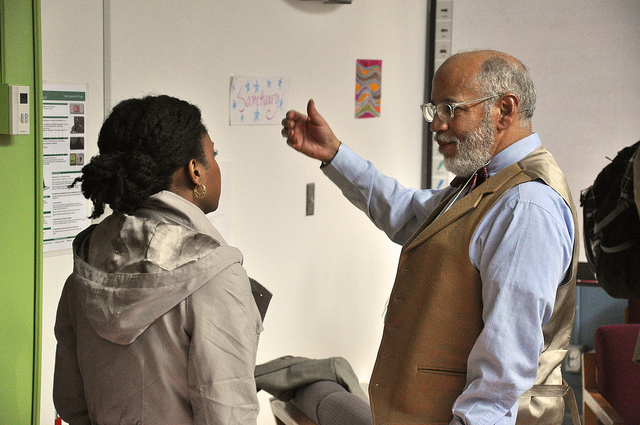Conversation at the annual conference of InterVarsity’s Black Scholars and Professionals (BSAP), 2015. Image courtesy of Boris Collins.
ESN is delighted to share wisdom on continuing in the journey of higher education from Dr. Claudette Ligons, and to highlight the work of InterVarsity’s Black Scholars and Professionals (BSAP). BSAP, a national ministry within InterVarsity, recently hosted its fifth annual conference in Cambridge, MA. Dr. Ligons spoke on persevering and growing in the academic life, a topic very relevant to emerging scholars. Dr. Ligons also has the distinction of a 100% graduation rate among the Ed.D. students she has supported through the dissertation process at Texas Southern University. ESN is sharing her paper as a four part series. You can find Part 1 here and Part 2 here.
Reducing Your Load for Strength Enhancement
At Texas Southern University, it is my privilege to teach and advise doctoral students in the Department of Curriculum and Instruction. When they complete the coursework, I shepherd them through the dissertation process. They apply to the program with a common goal, to complete the program requirements so the degree will we awarded in a wonderful public ceremony.
In some instances doctoral students underestimate how rigorous the journey will be. Often, they assume they can accomplish the degree-related tasks by just shifting their current obligations. Sometimes, they fail to recognize how demanding doctoral study will be. So, they try to add all of these new demands on top of already over committed lives. Because I have observed them over decades, I begin early talking about ways to enhance their strength for the journey by reducing their load. Here are a few illustrations:
- Streamline your Lives. I ask doctoral students to examine their current commitments to organizations. I suggest that if they function in leadership roles in every organization where they serve, perhaps they need to examine whether role changes might be necessary so they could devote more time to their studies. They might even have to determine whether they should retain the affiliation with some of these organizations.
- Enlist your family’s support. I talk with them regarding how their studies will impact their family. It might mean less time for some family activities and chores that they assumed in the past.
I ask them to share the load. Negotiate for long-term family support through a redistribution of responsibilities. Define what that support would be. Doctoral study could take three years or more. Insure that the family is fully invested in the goal. Explain how the entire family would benefit from the degree through your increased salary, more travel and other opportunities.
- I debunk the myth of the strong Black woman—the perception that we are bullet-proof, that we are up to the task, whatever it is. This thinking means that Black women have super-human strength. This is a super-human strength apart from Christ. When I challenge this myth about Black women, I usually do this in one-one-one counsel.
I tell students that when I share spiritual counsel, I am not advising them as a representative of the State of Texas. This is the informal counsel of an older woman to a younger one. I tell them, if they want to succeed, they have to recognize that they can’t add doctoral study to an already over-committed life. I say, we have no strength apart of the strength of the indwelling Christ. If we did, we wouldn’t be dying at the rates that we dying. Often we die because we are trying to do more than we were designed to do. Even an 18-wheeler has a load limit. If it didn’t the excessive loads would compromise the structure of the truck, endanger the driver as well as others on the roadways.
- Protect your relationship with Christ. I advise students over and over about the imperative to build and or maintain a vibrant personal relationship with Christ. I talk about the need to be discipled. I see InterVarsity Christian Fellowship as this missing link. Rather, it was the missing link. This organization facilitates students’ spiritual growth. I am particularly interested in the creative, new teaching strategies that are being used to do so. Discipleship training is the avenue God provides so believers can grow up in their salvation. We’re expecting great things from InterVarsity, at Texas Southern University. We are already seeing evidence that the outcomes will not disappoint us.
Part of Dr. Claudette Ligons’s Strength for the Journey series for the Emerging Scholars Network Blog. You can find Part 1 here and Part 2 here.
Dr. Claudette Merrell Ligons is Associate Dean of Academic Affairs of the College of Education and Professor in The Department of Curriculum & Instruction, at Texas Southern University. She teaches and mentors doctoral students, shepherding them through the dissertation process.
Ligons began her career as a Peace Corps Volunteer Teacher in Sierra Leone, West Africa. Other international work includes effective schools’ research in Thailand; research on parent involvement in schools as a Fulbright Scholar in Tanzania; and faculty professional development in teaching innovations at Eastern Cape Technikon in South Africa. Ligons says her work in Africa is among the most rewarding of her career.
Recent publications include The effect of legislation on the use of physical restraint of special education students in Texas public schools and A Study of the Experiences of a Critical Friends Group of African American Faculty in an HBCU and a Predominately White University.
As committed Christians, Ligons and her husband Bob work as a team in discipleship training and intercessory prayer. In May of 2015, they celebrate 18 years of service as intercessors. They see these as the most satisfying areas of service that they are privileged to offer in the body of Christ.


Leave a Reply